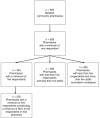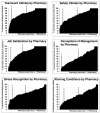Assessing safety culture in pharmacies: the psychometric validation of the Safety Attitudes Questionnaire (SAQ) in a national sample of community pharmacies in Sweden
- PMID: 20380741
- PMCID: PMC2868807
- DOI: 10.1186/1472-6904-10-8
Assessing safety culture in pharmacies: the psychometric validation of the Safety Attitudes Questionnaire (SAQ) in a national sample of community pharmacies in Sweden
Abstract
Background: Safety culture assessment is increasingly recognized as an important component in healthcare quality improvement, also in pharmacies. One of the most commonly used and rigorously validated tools to measure safety culture is the Safety Attitudes Questionnaire; SAQ. This study presents the validation of the SAQ for use in Swedish pharmacies. The psychometric properties of the translated questionnaire are presented
Methods: The original English language version of the SAQ was translated and adapted to the Swedish context and distributed by e-mail. The survey was carried out on a national basis, covering all 870 Swedish community pharmacies. In total, 7,244 questionnaires were distributed. Scale psychometrics were analysed using Cronbach alphas and intercorrelations among the scales. Multiple group confirmatory factor analysis (CFA) was conducted.
Results: SAQ data from 828 community pharmacies in Sweden, including 4,090 (60.22%) pharmacy personnel out of 6,683 eligible respondents, were received. There were 252 (28.97%) pharmacies that met the inclusion criteria of having at least 5 respondents and a minimum response rate of 60% within that pharmacy.The coefficient alpha value for each of the SAQ scales ranged from .72 to .89. The internal consistency results, in conjunction with the confirmatory factor analysis results, demonstrate that the Swedish translation of the SAQ has acceptable to good psychometric properties. Perceptions of the pharmacy (Teamwork Climate, Job Satisfaction, Perceptions of Management, Safety Climate, and Working Conditions) were moderately to highly correlated with one another whereas attitudes about stress (Stress Recognition) had only low correlations with other factors. Perceptions of management showed the most variability across pharmacies (SD = 26.66), whereas Stress Recognition showed the least (SD = 18.58). There was substantial variability ranging from 0% to 100% in the percent of positive scores for each of the factors across the 252 pharmacies.
Conclusions: The Swedish translation of the SAQ demonstrates acceptable construct validity, for capturing the frontline perspective of safety culture of community pharmacy staff. The psychometric results reported here met or exceeded standard guidelines, which is consistent with previous studies using the SAQ in other healthcare settings and other languages.
Figures


Similar articles
-
Swedish translation and psychometric testing of the safety attitudes questionnaire (operating room version).BMC Health Serv Res. 2013 Mar 19;13:104. doi: 10.1186/1472-6963-13-104. BMC Health Serv Res. 2013. PMID: 23506044 Free PMC article.
-
Psychometric properties of the Norwegian version of the Safety Attitudes Questionnaire (SAQ), Generic version (Short Form 2006).BMC Health Serv Res. 2008 Sep 22;8:191. doi: 10.1186/1472-6963-8-191. BMC Health Serv Res. 2008. PMID: 18808693 Free PMC article.
-
Measuring the patient safety climate in community pharmacies: an updated national survey.BMJ Open. 2025 Jan 20;15(1):e088323. doi: 10.1136/bmjopen-2024-088323. BMJ Open. 2025. PMID: 39832961 Free PMC article.
-
Review: application of the Safety Attitudes Questionnaire (SAQ) in primary care - a systematic synthesis on validity, descriptive and comparative results, and variance across organisational units.BMC Prim Care. 2024 Jan 25;25(1):37. doi: 10.1186/s12875-024-02273-z. BMC Prim Care. 2024. PMID: 38273241 Free PMC article.
-
[Psychometric characteristics of questionnaires designed to assess the knowledge, perceptions and practices of health care professionals with regards to alcoholic patients].Encephale. 2004 Sep-Oct;30(5):437-46. doi: 10.1016/s0013-7006(04)95458-9. Encephale. 2004. PMID: 15627048 Review. French.
Cited by
-
Assessment of the culture of safety in public hospitals in Brazil.Rev Lat Am Enfermagem. 2017 Mar 2;25:e2849. doi: 10.1590/1518-8345.1600.2849. Rev Lat Am Enfermagem. 2017. PMID: 28301029 Free PMC article.
-
Formal Assessment of Teamwork Among Cancer Health Care Professionals in Three Large Tertiary Centers in Nigeria.JCO Glob Oncol. 2020 Apr;6:560-568. doi: 10.1200/JGO.19.00233. JCO Glob Oncol. 2020. PMID: 32255716 Free PMC article.
-
Evaluation of patient safety culture among Malaysian retail pharmacists: results of a self-reported survey.Patient Prefer Adherence. 2016 Jul 25;10:1317-25. doi: 10.2147/PPA.S111537. eCollection 2016. Patient Prefer Adherence. 2016. PMID: 27524887 Free PMC article.
-
Evaluation of patient safety culture in community pharmacies.Explor Res Clin Soc Pharm. 2023 Apr 7;10:100260. doi: 10.1016/j.rcsop.2023.100260. eCollection 2023 Jun. Explor Res Clin Soc Pharm. 2023. PMID: 37396109 Free PMC article.
-
Safety Culture and Attitudes Among Spine Professionals: Results of an International Survey.Global Spine J. 2019 Sep;9(6):642-649. doi: 10.1177/2192568218825247. Epub 2019 Mar 4. Global Spine J. 2019. PMID: 31448199 Free PMC article.
References
-
- Kohn LT, Corrigan JM, Donaldson MS, (Eds) To err is human: Building a safer health system. Washington DC, National Academy Press; 1999. - PubMed
-
- National Health Service. An organisation with a memory. Department of Health, London, Department of Health; 2000.
-
- Reason J. Managing the risks of organizational accidents. Burlington: Ashgate Publishing Limited; 1997.
-
- WHO. http://www.who.int/topics/patient_safety/en/ Visited February 21, 2009.
-
- National Patient Safety Foundation. http://www.npsf.org/ Visited February 21, 2009.
Publication types
MeSH terms
LinkOut - more resources
Full Text Sources
Molecular Biology Databases
Miscellaneous

